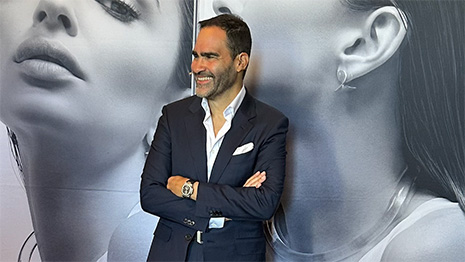By Daniel Langer
The latest Bain luxury study clearly indicates that the luxury industry has a trust crisis.
What I experienced at one five-star Miami Beach hotel in particular recently was nothing short of a masterclass summarizing every possible shortcoming of brands who promise luxury, price confidently and then underdeliver spectacularly. While the hotel’s upscale, albeit dated, appearance may initially impress, it is the profound lack of genuine hospitality that transforms what should be a dream stay into a nightmare experience.
During a recent stay delivering a luxury keynote at a top luxury event hosted at the hotel, I encountered a series of disappointments that starkly contradicted the hotel’s lofty promises.
Managing misteps
From the moment of arrival, where doormen neglected basic courtesies, to a robotic and unsympathetic check-in process, it became clear that the human touch – the very heart of luxury – was glaringly absent.
The room itself, far from being a sanctuary of comfort, was in a state of disarray, with remnants of previous guests still visible. Attempts to rectify the situation were met with indifference, highlighting a systemic failure in customer service.
The staff’s apparent disengagement and lack of empathy permeated every interaction, from the front desk to the bar, creating an atmosphere of neglect at every touchpoint. Perhaps most telling was the general manager’s failure to address concerns, despite repeated requests for intervention.
This blatant disregard for guest satisfaction reveals a fundamental misunderstanding of luxury principles, where personalized attention and problem resolution should be paramount. These observations, echoed by numerous other guests, paint a picture of a hotel that has lost sight of the true meaning of luxury.
This specific hotel's failings serve as a cautionary tale for the industry, illustrating how even the most storied brands falter when they prioritize appearance over experience and when the guest is seen as a collateral rather than being at the center of attention.
The "4E" luxury framework
When analyzed through the lens of the "4E" luxury framework – emotion, engagement, experience, and exclusivity – the shortcomings become even more apparent. Emotion, the foundation of luxury, is notably absent in the cold, transactional nature of staff encounters. The hotel fails to evoke a sense of belonging or personal connection, which is crucial in luxury.
Engagement, which goes beyond bland customer service to create a meaningful dialogue, is lacking in every interaction. The experience, far from being immersive and (positively) unforgettable, falls short at every touchpoint from check-in to check-out.
Finally, exclusivity, which should transcend price tags and make guests feel special, is compromised by the indifferent, unempathetic one-size-fits-all approach to guest interactions.
The framework, developed as a replacement for the outdated "4P" model, emphasizes the need for luxury brands to be radically client-centric with amazing products and services rather than product-centric with the client as an afterthought. It recognizes that in today’s hyper-competitive luxury market, creating desirability and extreme client value is paramount.
The case study at hand illustrates a fundamental misunderstanding of these principles, where the focus seems to be more on maintaining a superficial appearance of luxury rather than delivering a truly exceptional experience.
For luxury brands to be successful in an increasingly discerning market where clients lost trust, they must recognize that true luxury lies in the intangibles – the warmth of a sincere welcome, the attentiveness of staff who anticipate needs before they arise and the ability to make each guest feel uniquely valued. It’s about creating an emotional connection that transcends the physical amenities, no matter how lavish they may be.
Next steps
In my luxury masterclasses I see again and again how many mistakes are done by underestimating the human factor. This case serves as a stark reminder that in luxury, reputation is built not on grand façades or marketing promises, but on the consistent delivery of exceptional, personalized experiences.
Brands that fail to internalize this risk not only disappointing their clientele but also eroding the very essence of what makes luxury truly luxurious. As the luxury industry continues to evolve, it is imperative for brands to refocus on the human element of their offerings.
Training staff not just in procedures but in the art of genuine and emotional client connection, empowering them to solve problems promptly and creatively, and fostering a culture that truly values the guest experience are not optional extras but essential components of a successful luxury brand.
The lesson here is clear: in luxury, every detail matters, every interaction counts, and every promise made must be not just kept, but exceeded. Only then can a brand truly claim to offer a celebration of the exceptional, where the possibilities are, indeed, limitless.
Luxury Unfiltered is a weekly column by Daniel Langer. He is the CEO of Équité, a global luxury strategy and creative brand activation firm, where he is the advisor to some of the most iconic luxury brands. He is recognized as a global top-five luxury key opinion leader. He serves as the executive professor of luxury strategy and pricing at Pepperdine University in Malibu and as a professor of luxury at New York University, New York. Dr. Langer has authored best-selling books on luxury management in English and Chinese and is a respected global keynote speaker.
Dr. Langer conducts masterclass management training on various luxury topics around the world. As a luxury expert featured on Bloomberg TV, Financial Times, The New York Times, Forbes, The Economist and others, Mr. Langer holds an MBA and a Ph.D. in luxury management and has received education from Harvard Business School. Follow him on LinkedIn and Instagram, and listen to his Future of Luxury Podcast.
{"ct":"JLuTUvw6DuHMCNUAluA14nl0PsF62wQAgdV38N6kEU9GGv34RBwGmIySD\/8LlGsD0XKtJUMAWJdD4saKEk\/k2hMljsjZ2eC8+8ApO6bneKZtykOtUb1ylS65on9\/6dBeSQmq5JtNOHDhlp10zbhJUv4ZNSmS8iRBLyPNu56iCAV6lPge2O1L2hxo21ZogVZYR2vI4SdZ72\/k6qcC\/mm3ZBbp+cxXw4j4K\/fWpIjv3qkCibyd0+AO3E8WHGcYPKwztJVyNczc8TadRf9ZXe0FawmblEtfxNqaek4W98cV7nYdIhXQOvzKus3CGaFDP9Mq+sJL34y7J3UqSBb1lyWGyvHWh8zs+NVu3Oj5oZ0Z2u98Q3p326rnz+H6lMlt0SyoygweI9ztQDZUpyaEM854Y+3X85TRuI6PukNeYdfNehgIcXG2BzW8pgJ125RdA\/ZaxfbMxEp\/3o\/qs+NBHnNWdn\/2ehslEKLnr9FgVetqgeiv6AblCIUQ5UgAY8jiHNDKjL6v+qY5Dce11el+jgRtJgtESEUp4YfSP62nTbEwhwYVhQSZVdpFAPwExK3Bj9Engxx68gUNtZCaJASS4qkQNH7DU1JgSCJMoN4TnESCbIctOJ5iW2Lva5+d2js8AZgsr51cuilx2YxZv52PTqcfKdubwx1TeePMvp9HB20GEhnkrVKpfKJ64x2La0KtK2W0yERauVdCe4GJzIW2jd1wNOIp7RnugeNwpDs9kBhWBFlXl2s6bU+cC2uLoXGUgOvlaCDF9xFkdmFu96ObGrMwhBB\/UIVTQahfa0xyhjD+wXFxtfRlHplsAuUM37akhcfakAteq7NwzNpUET2PbDxNLudTdA78sPgsSZvcN5Ghoq6emPAq3RXoVIz39cZ4imUxkgRaVPYeWRFR+GYo1J3gBEgkVTw68y65rxxp+v8+2gvek3UHCBMcmPgOoimQQds0u8mKNYs6Zu8ZQxFa45P3rOLKyEoFECH97NItAVUDDRH254vUL0POFHvTUKyzd5gDNNThkEy0hqdjDjdsVmkcfPU3oROElahOcXEoib5iirSJqOl+YWVc2z\/l6LLnQrIC1MjtfqBGbBBn0YsVJHGcRtfnRusrb+0RYGDBZBES3iW5Z1g1ON3MRvapXxxOgZof+bqVBZ5r+Oi2yVv+pYK9mmTNgTQCJeVyQ7J5KXQA8EPNenT8m5SfWiSoRBiv0D1yyB\/MvOZKZYu9htBmMaMw3TwTsjiFpjeyRbIDyP2BHvidRiMSZlz+Q7N+wZiyNe69HhbJh1YPkedbTa0cpqYDp00xcSmWVxjX64hGBQiB1aiDwTN2YFPViKGyEE2aMR3gjS\/2puE9dHpM06r+i4P\/Z4tP8uQMZNbO5tLRQFztnqlnd4P4+nkdqF8C088+ZiarKANhVdT1jf1yJkIu1eKfqAujuCzbIkjI6sVovxHvTVFJ24kGK3XSPITuEF\/tv1+4o\/AYatqPzr2sBShTBpyrJ0mOOJ9PZPez+t\/qCm5knWh9Vsz1c3tzRrryrq7x57vm9mcIKKGfSfhvrwPpTy4tUSCWoQqL9hlKCOfugpsUCFQhoY+O02mh2Hp1+27SjWtsnQGtcVNT4h2pkobah1FXLOO37NitYwfPlj6uhx3u8ltC1LqiGzcAZwNiwcp3NNeLvrzE5D7qT8c19uaonRUDKbEv4+owl0zb\/pAFfW1icmjJrJpcfmyQ2N0mUM5Q5V7s0JPo6+WGEpxdRJErMyCqS2ZfmoQYJQWC7ElachfWQk4ZO1cs1sjj3Y+TJvJpLtfz3iQTnnL4+PU0LnJqEoRYNfdgqRtfMl+whWfKkNPTZ2OGM+aZhh7ooos9jM53bgQKji5V3ZwH19E9Aw6JThv0A\/WyXk1Evk60pUe9uHqBJWKJODTFq1384EJ34eYZNgJ2OEbqLHl3pz5JiE7pMF1GwQcETJaqFfeo\/jHjI907sXpckeYCafIMcEeqL9O2e3xh2LqArFp3Yo2\/kHHB11rYcgl7xMOnzmvOUER46DfRnEAbl3hN1WE\/tPi9kyqbPvO0\/cMYXsgotvSKOJ2xcysxGfgNFJjlzxcLEdUVpEu3dOa\/eFBwLKc29coNXlK5Uo6Jhvh9PY2EctbyshV+FfBrp0N9Dk817znip0azOLjueHZ2AHPaaOWJhj2Jj\/\/mEuLPrzOO\/mb+cJVIlZdzLqeHDJzB9ReCK1RlxZA6R\/WiOHuHbK86KmzzzbnUzSIv0xDe57G6NL8lHQMvyV29ZcHdjWdSW3cksNJAMpM4GYteuX3zOEXOCz+2EUbVwAcbLkbok0g6z7vQrcWJBipJtHfPBcYxFJJ1WPieaWg5+WyF2J0oB02GhIugGdZ0Rie58hFvOZQ6vmwWi+9pZFXVqfu5M7YtSUhkxLOpKM5Ky6y1EAcmuRGlR0egRSfRXXUKkaRyxI0QQTQ0m3Fh+Tx9RvAkIpxIEFx79ORlJ0RzG5tfjKpKx58SMiYs60p5vGggM8niLZXHte3BpN9IU51Mw59BbKQMeeqDHVr1Aulg6TAdHL64GSKbSVoUb8oeKDFG7NAi6khyB5iu4gyrPEadqNr\/x0UF0\/3QaK7zxNAZqvGFUV7LFFqwqOBn\/+t7ZMmCkOIRrxPiJ3PNB8+gFekW3cwbuTJis9ZsupEJu1E03L7vLGF0yrZ6vM6ZFiRlTnPUqQSRmHc0wB7zpZ40st+sx7JS0pcRIO\/4sLKF5kiziUwDqNEUo0\/6XzL6DKKYiv9\/L+2sHl0Mday8z0T+K22G\/MGcJVpoiscSTh9yJdsMnPzigkoR0ezJnR2H0iWG534P6Zc1gBFDa12AG12FCcyaW\/HACgV7DkANxcf\/rCUDehGwwEMaMSNNI4Pqhv4IeTFFSZdkduWorwTIrq\/edVENwnEvLq\/5cWyQbtLIqng3lKL8SdbiiaSi10ERt5QPbEG3Pqhy2lmI+WG5t3h7rRPkCAY5g2r10rnrKIdQ6dLyjE+vGpOOw05VvwoAiqQ9L4DLsR9qp1N5E7\/vEywRDcU4DoM8M1HPOMbaO2nj5I8yCao+Awvnnh+rd3hpWx9HqWudAjsbHQXj2hvDezJBpZzQquzv3thTIb6v\/Z6h5mYTJF76k8o4MnXBGhxKnYqVgaXBVAdQXnOYhVe\/XKR8m5GI\/eiF7e\/1GnEfOZGWyilypQWd7fK2ZvqM4tnnX06jAOH4q4HTNs5m3+7HDRXzJFZtgZsZ2kcO\/JR+FRYONXm4zvkJs8+7yGLzoMXyI7N4c6IM28vtRynN4PewYfBLxThaE+lelhgow2rgltSYwJ8zOcMCp8\/5Q1jMgbN2hJ+WfBU+Ejhse9N7f+OhkGNlwEoh3osqRzeOSv7WiNENRa96OIHCB0sUSmOhz62Y1\/iffRTDFkmKRUx0G4WR6KdxMRVB4ObiHpSLSB6w7K2qtJchT7Gbb2Ixg7xjboOpfr82v+xxur98WkajgBwi\/X8nqQnpdlS3\/vWkDZOsG0ZBRtOWSAfizQCQQKyrL3ShxAxSIa+j+\/PDuPgvH3ECh+CNphSaRV6deYrbn9gLeIehThakZQ1xLuli6RNuyYf32T41sTx62jZBhZ1n9f5uEMam6RDDHiMqbEDr\/cr5llXycK+0fxtfIU7Q2mzOq1d5HYYdqN1WRMJqAzw7ufv+iMe+7kDNu\/9g7F8IgEs3R5BtAktqxeQNakpALKRWaU+PPqJEzgNh62ziF59K+dpnaLIKl68TAv5JWp3XBaSr\/IPLVGjrjVGmyh3R2LUX3deYlxQEWTOW0I724d4p6222Cwp3y61raNqbs+vkTx5mt8ahHRpVL+uJm+7h7y1klhe5XpGo4+y2q30LT6tPFzOvtAJKYxXh\/ui8yKfI39fMah\/nGE2wDcwQh5KUerhH7ozD6PrCU9UUTso87pUSmZYwd3Jz42T\/Z52dnDSScUQ6tCyanVRhYlkNPCsKFxxo4mJ0ykk2c1xbVpl8kn8P+eNtYjLf4Yq\/rd+ezIDXxtFIXL\/BBdSfzUwekD33f1n5dCRTIkqzbmjSkSnTiBTsECIBZXemP+ifOdRxnP3C0XMO6l87vZrYP9M\/Bzqe7j3dqVaEk2U9avxIm7Lfyo5gZ+tfgqjnYr77aPsyb7vR3ysLQQJ5ruUsDI8fDwRKegbwyIfry4d1TWtt388EIycny3wiC4cDbq4rHDz18A8RhS03hQtpgljLq1A149wxRT1JTmKbrePECwhPPpOwxteqeuQR4jlf5sc2jkPz7SqwulZpRqywdkqpimnRTDSMiiqPt8oNW14vafLNR7mcOUGzEG40bB+4pWHaxglYTQUCXJHIUWRGOruo5k1pYLj2FnLvJ4hlZP\/L5TAIT+jutDQUa+qYs6uUmPsnGmASGFWpwNxwEHdR22sqy4KtrozXDueeNvfK0NpRyPsB5fEVu\/TIJInIWg0X53aOTmdIT90R1fmdwQxXaVIYqgKQIPwx+bseBFwKYlcI95\/VThbaX38nLY2T0ZRbrGQkCcp\/JevK0RJ3aI07pJdHRngpT5BW285+O8uCo8tG3YTIhVH1quDpj70FAflTWhtoXc+0cxj7UIE9S5O8ykGT9bbYn+kfmVL4ojr+eJcWm6EKp56tTvWrK3WSE7yUoIbuzq1OiEIdR01+l1bp89mXeTGEy9jf\/lbir2zUq16+GeSfOIpCXyyXCcxyCgEO\/UePdXP36SqYr1Q5FkVHOFZC8IEJ+X\/8bNaB8AWZ8OLwwxUE3tbWWdFy7MVWMy4IMjRDMK20TEAORPuLVfaCdUzwtLo3LHArN5dDldsG7+CobGxCB7XHlKkrXOu2rg3\/4V7uxA04lXWUVzPDS973kL3dptmEtVMI02oJssxrTqvqr6IzdTrQ1pFz8ySsnxpftYSEyAEtRjDQRNIrYYH\/uddH6sEdmsQS5Vz6ckRsZd4BxUGdumXo7SewVK8P1IMVCkpUhRrMDOdHYGN9ktOwubqnfvMHc76K7mu4+VmTA8wLYSszxmngmRpqNuTVgRzusNfmYDDlsdYLisIcCcirMSsDcT7L2oq7g8nfzxhMtFQZv3fl184lakNiPSamzMwwX3y5FkovJ6wLz5upJ99KEWKx0+C+7G70Jax8SzEsZA3V3cekkG3zdtOv2\/GUaJcEYqOwHIYVjQagD2r81c9VDzaPDHqym4bm3mEPIoR0RFE3Yvq89JpNdcKotmzuaNTyrwEYRbe4Ijy5hbHXFiVt9v\/J0SIUxtnbB5wpPyQ3WljsbWFWpVBe4POPLoLGTDpigVpCV8eVSzTfdzHqRZ95qhPVTiHwyNoxmgdT8Z9SOWMolNOVZNqn3Ru96zf1HrCTJHfWyEFc\/4Phuup4p+8S08oHJ+8F9EKtkh+FaGKEwFKsapA4Qir9M4950W2vy420z85V6EYEQN+mC+jqXzKAQY59gy+RnPmdoe2gAOckqwYQiHVlsiRniHOK3BtAcwJ3XMJo7+J7J4CqhJ+Rq3TTXD2ec3qhbEGugrCUokJzuhrXKIIZC02qefTAlLd86pDjpQkvL6A04MNLsKZOHnQxNP6JGo7Dk+9ERgsYqPORLbEBIRf72zaKAudUe868jqsoUFW43LWSYPQ3SsM7J0zVv1YKsA8UxSfyePsUalpomrm5fIwt\/a1aOmmdi\/6w9u4C9AiyXXRXeEtvIV6Nynu\/x4jgsqY30Llmaen0FFTvKLzhW2Z4Y79ih7cBk3S0UN8p+aIWKGiGG2m55mKzkkH2WBfqbRbduIgSXIHRGLw2K+zjnGGlQAYV5YeM96ZqwNJfi3U08QchSSXWJRswSyaxp+MTnrLb\/fKzBFTadF2eR8PHPkO0aVceBDQ2gKMZ2aN7lD\/ZxPPSVjCuSOnXsy7\/NkiiecUgyHpNxpErzj6FT5CTRcJuc9XC7FsTm9dvl9MksSX+hJuPbb6lGcJ6s9Vw+dPlLKYFQEyafG4anoS\/8XgPIG05QsQjPMJx2e2Im91\/cu0PwwsR4sbDGlp7tqLpQXNPrWSVbTCo3Md4VePMweR0Yc433s0DrAa11KXh9hEbz6wrNYH7\/gT8QsaBDTsvEj2CdZJJZlVPn3e8tDlxQPUHMSlBWGHhP1PEJhltGqs++8gPAhd11fy9HonaXrLox56LTOGOGtxwhasgf3Fbod35ZopqZEFn0qp80rYnGstLWBHizm6oSV3XZ0NESYDHFcJ01CqhnodZEB6ChEB3TGi9U1vj3LQ2+BGvvNeAa+vIrKkzIOokOIFfrBGZB7RZWbUIWReGCd8Majwd9t1F3NKy6ToHZP0dtpxWh\/LZrFR0D3458szSgDjD\/T2FL9IEe0hIBipOT8QQ0y\/B0e6grP4MvymqdgcRpB9HV9r+skD2vVquNP8yUjpB4rOQSSJGmNsOvplhYmuo7J3YjvLGZZyoU+C0kJVa\/gsIda\/NiwXBcLT7of1Nu0ukSHD2maCtuZxhVclq2585Tg4KjpLXdfxO+5szviXz0\/bNc7UfmW0AnLepKWehfDbHNDxcewp2pDCvxZ2xYB3YqM73OuUqhgCQSZPkW1HoazCC3SDRrmvvTV5E+TYjOkuDjGiax\/3H8VyMTozlW8\/lDJJKYzak2s+lGdPXXmuHEH5z6x0n5TyDrpXZMFHDCufDDd2DOnDPE2ghA8ADBPeZvI7Ev\/hL+KhZkQ8+8p7DtHOXgeo5fwM8g17B\/4MXe4xK+nlGQ3cxRwE4hMQinWg3Yxdq97nnjKMEfH0ycWKiR9vmqbJn+Oaj1MJvwDKxJmMl2vgG9+W92\/Ndnzac4iXauQq5jbOrjhPpwErVsF6eDwd4P3ThdFH7TFcD672aP7WIL4+dM2R8nSHZNGGRtzPhEn1cps6cQlDnLp8pYLP4aA13NfUAbGJX0+\/Q1mV1x2u+8XERdWWafXBL58IUotnZd+UuFVLgTb4YsroK1HP9nKIvxejBjAeWPQtfNYCyu8u\/7wdVK9irfJa\/QuNMPgcMZh7snkthAq1fKzdJxTykgL6GW5DJN1b5UukecQiXJKxNuP7mGG0eh0bwsQQXu8+BZQ3JQcMdmvg6Nuc7VPUAKlyQfIYxei7lgImXov9ztRbJ08aJ2MD1nB1vcuFP2zx+u4\/sYH3wSaIGtsLMLdZnOPCwpcJg8H9ZmyZJBJCbppXcLGA9FOveIP6o\/sthlGpukYyDOjtwyx0b1uylpPImNPfI5Q1CGmxZaPASS\/50FgHo8uWCs6Gvk8g0abHaS+3BwtEkNv\/0\/c26Xu8hdTyS6Usb34YMF4OfA9X8h9kQRTU6qi5XHTRJHkuaOJrBl\/hXTIW9os9LTfA9atR3J0gAmmATa0IRIXQwcVHk0g7dCsVNpL0oRinCyWU\/kvoNJ8cox7WCeVPcrRY73OVGh0b9jVDwx3rzWc\/btEucnYv+eEHY18Vp\/EgdxTWEaUTB7mjKhndewmaZRX2WZqkdlI4wc5d8ZDKIaf2S988JSmJZoojjeMYiji88D+EO\/tv7xsZL+R82xCfOVa1PMY5OJlnVibGOHocHNQUR6Z43RtNvq7cEOF0yHn0YAkP1K6HkfxayIYSay2e3ODq4b3PNEIEakTejXZS5rDuAh34wzoUq27MNf3YYIuba18QQ5Oys7N3rH2M4QYC5n9ZnKS3dCe6qEyA19XJmXpb7nklTCdvWVpEcBwQXRNdrlo6SMeqJeebtumN\/7AadIco\/cUWTrt8RUYsbYiE2yVdElanJpaUUqMFddzDXATJTCzY\/M8vr09fSK2xOj54JYM5hCllkdcbe9qGdsjOsamRvGqI+tNyhWhzWIoavEDJAyePCUOgkbye2Xz8\/7nsWsn6SX2OxlCWSiBKvx2W86FHP5d0Ew4REbEsO0\/S+SAM1IyD\/VMt7eSyjoFb2HE2IhXrSST5WHMLtCg0HQiYy1P8lXNizhykvag0gLOSulv63h9VjjWa3ScYnjwGgPJSTGB2GciOyjjvftC2\/PvfSe5+IqOoBmusG5vS2gOwCWLo7ZkGoYnGTZ85cW3G77AieHtoLlwyJ8zB3tyOAqKzxQyssTjD332MZvGgSrvGkagh6rfjLZ0nqJf72BsSVU9mxu9J6Xuvs9micTrtQYxxSMKOBlcV59t\/lGnj8AcBnwT0W3FmzFKA9mKcZlK8mzAbeicbXnfDPTNy9aAdAVOGeX1j+SuTVw+yc7MACl+litswcvLvA1hMLn5mG4IznE6jwZHXH3l79ARX\/9aM4v39uRG\/tMSHUFMZHELqY5BNybdz96nxALj4KC8FpaTFgYYAEe4jrW797Y7Se4BJtW4k6fG2ajbHt1Zn68vglQ3q96F2TkTFpZVz0LofzMefGsF7V0A7w962+meM86A\/pdvX7Xa13PA3vLigGJXYqAjJ7RHQgBlizy+sXtJlyhZ0iy1RwpNIvRAfTvkN+gcYU9MxmJHDR9SZatDIjN28kHLbD0GfGWpKZFg+9R98t7DXxVrZ7seu+PNWlkgkU4T9xOtTJGhpPpdXvymCMM2IszORt\/c5aUvuarBi5+CfCnJtjxzs6ZJUSWjHMb3MGckjLioIB24NWbZ5VJ6prlFYirNt3YSnnyv\/98483VEL5J15CsOYOwnRYMYtUrfPkYVVtNtVdyMB5sjwxFfUL2R3c0EvKA7J2znF3LQ2SFYXmkRIVNIhQocad68yiwgX\/phTD0FGIo69ZzNFspKsZOU1sk9CTeJ6cdzdBWCuhPBF0fioOUquiZxIGgx1bDxcqIhYAA0SRkdDde9NrH\/aPNVV5mSzbm4CO33OfPZ5R4+PRBH2vzRP2mX5gqMfcg5I3SOxorV9DE3OfYtxpojDJOEdleqK2pD6REJ+q1uw9qiCg41r2Uz3AiRMvJ8+Qh6hmITkm\/uKp4e4df\/3ZjpMS3WlCaNI1zmAfHqyyExvOzcVFM4IoUnkd\/iKXHwW3+pO\/OFj3REAIBNQ\/4HB4wHMInusCzsjeQvnSGV5E8r1lxIx+pdiTiMd7FwrDfE7zontQJ6Vt5hgzNzVOOUBYFflmMj+uCT2OXsfbF77OHgvvJEkIoFob\/jahOESK2JTvDAy\/xgVRU4H1wC01Iyfq8dwP008hC2vwuU8k1jnAn5\/Dtm4GlFFeXvirvucuwDG3127RpkiEhQA2a+G26\/mwbqW7O+eJEpinJEEVGcpXgjpTLMXxL1pyeJam\/BUXSFtGhQRYkYh+4JLjT5Jlkdgxj5DWDY5X6xKC+gOwLt\/0urK\/4WQ3cPFjfr5ywK\/orkNoROvh0E3wnoGMBdLWb\/k9I3yOP5M1ZbOq8hD1QcIx2jfjsp83Yi4Sa4AuRWvl9n+56xEg9JFwRVg9oLTFTRI8LKUu0W27PIEtD436n\/nBqSuWY6PRQ2hAxAWcnPZgzNKO8gBl1L5kDvaxd3U+OxqoZWxVY0UxRLo06rt8K2h0fTIy2calhFvHE18f7G\/y9XTNIz\/lZue++K3FT+qdBhHXlTcgiuN+6\/1urS0c4PWyb8fH2vIYwFx3Y9oMMxbP74D6e+auxboE6R89M69+hrjyC+P588v\/zloK992f6\/IYZhwBySvzqK3RvvBlVWBB41P8X00tCbIWPnr4uGMablrqmapmdKmkCEl8Vp9xaRrKn6NJ4mgtEjZnqlpMCmgzxPIzKDjbDLKVwk9WLz99zUinNeYqM9RVGFPCNMDWFCFeqqo4Vspz+0mZtdwTgDal2Z5itGJf0EpFQOPKYcCfqJFIrPQKflRVVGeOh3HcqtExcTl7EyNznyTJpxW1RB0Tu6dElSlbUMN8pIpMg7T3JQOif9Fhshyc0HOV7Nf7GAq08uB0WHKCDfSnvy4AtMNIIeCmy0GfMr5JIDZlNBgTV1NvEVnmg7I6agFYlL5dBRam7XK54QJTO61qArG1rGivBV33TmTFQ6CLPvPxMrwXfy3PNrsEzgDPjbi\/5C4hWSq7DRNydShAnnhOXEtav2DjshpKhs0RtUPPzMDFZiwH\/OOiaB++MYFLPoIeM0hFsVgGDHLusg5ZlhIxchy5mQsEgPrAQ5EsSC5D3JMHm7WJYQQs6omaBqvjZ9nRN0wWWbx\/MR\/zbrSh8czbc49o9cuWPeescjjsxYieVG0fv1gkaEY+jMHnlQ3PtIfVinSGSfXFRrKb2YP0mJ7Zgv9swm4tGv2vFHROgDS+qJzw3j0WqrhrGa2hf2Ub70zG3nh8dx1ZFM\/HNwBYrr8G\/18lPXHYLYXI+oKQOydWhj897B+Yr\/KsQp6Pf7WMO6QgkSaklOdjjuE6GxmaTh4siH8R17yM9pHUF0ol5rgaqQ3kESYKdCFDm9BTkNJ3LH1yKEaF+ywpuAONuNCN55NXLzi\/IMzif+Tkr9QVxZbBhsHdqayYCBZzB1dbeWgVFqObnpd2zd7GAOq9igL7d5nQtxWfW5YBBjTv3ujjdd2ZUhLdzlVlHAPxYmIOQiqIFOV0SuscbfR87pOHosYssx8OB5MPPM+noPlrTviJSNCQ20jmMIyUsY0VojTuHXqQUK+RW5vWju6oePyPxKmghQsmCJn4wSnaDkPmMO1E","iv":"a9d67faed6b43946f0d9b31c0d4204ae","s":"e2bb2627a6c3d8a5"}

 Daniel Langer is the founder and CEO of consulting firm Équité.
Daniel Langer is the founder and CEO of consulting firm Équité.